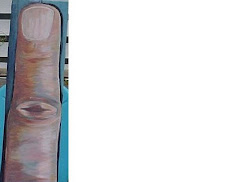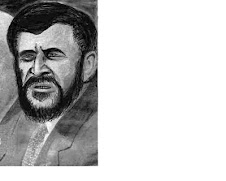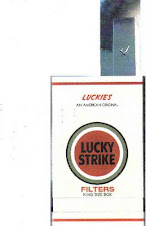 |
| May I? |
It was in the summer of 1976, a short six months since I'd moved to San Francisco, that raucous capital of exhausted hippydom, when I experienced a strange event whose occurrence offers an analogy of much of what's transpiring today, I think.
We were walking along Haight street when we saw a mural we'd not seen there before painted on the wall of a building whose windowless exterior was begging for it:
Oh, Look, a new eyesore, Scott sneered. We howled, as the painter of the monstrosity before us was revered in the neighborhood as a resident saint.
What'd he paint it with ... sponges?, Stephen asked ... We roared anew.
Well, actually, Harold intoned, That's exactly what he DOES use, speaking in that special manner he had, his English accent and superiority in years lending him a position of absolute authority and clarity in comparison to our habitual herbally intoxicated waywardness, so we listened as he went on to explain how he had seen the artist expound in an interview. Harold went on to depict him as a pretentious artist wannabe, substituting rhetoric for talent, painting a picture of him as being more of a huckster than a painter.
Tim, the main focus of our story, was a blond who hearkened from the vicinity of a lovely city to the North of San Franciscan, Santa Rosa, who was following the conversation in a sort of rapture of mental synapses going off in his head like sparklers, dazzling him mentally the way sparklers do visually when they're held too closely, but also confusing you, as was the effect on Tim at being in the company of such a competitively quick-witted group, since, typical of a surprising number of Californians, despite the existence of Hollywood in their midst, he was not used to the rapid fire wit of East Coast, urban, gay repartee, resulting in this particular neo-San Franciscan becoming inflamed with an idea on how to make a triumphant impression on them in a spectacular way, and who just happened to live in the building right next to the location of the mural. That's what enabled him, in the deep of the ensuing night, to make furtive raids upon said mural with a roller loaded with white paint, not totally eliminating, but badly defacing, not only the mural, a moral outrage in itself, but, something in his hippy-like simpleness he never even considered, the private property of the building's owner.
The next day the Haight was in an uproar about the desecration. They were practically carrying pitchforks through the streets in their search for the culprit, vowing to not only beat the crap out of him, but to have him thrown into jail in the bargain.
But since the Timmer was up so late, the next day he didn't manage to drag himself into Harold's studio until after the initial hubbub, which he had therefore totally missed, had died down.
So he was completely unabashed as he related how he had secreted a pan of paint in the stairwell of his apartment building while he made mad sorties out onto the sidewalk to take determined swipes at the mural with his paint roller, being careful, lucky for him, not to spill a single drop that would've, shades of Hansel and Gretel, led back to the source of the outrage he was perpetrating.
As he was relating to us his tale of derring-do, however, he was becoming increasingly uneasy as the guffaws of incredulity and congratulatory howls he'd been expecting were not forthcoming. Instead his little tattle tale was met by looks of opprobrium and scowls of disbelief, as well as warnings that he had better be sure not to advertise his little escapade outside of our company or else he just may well be lynched, such was the level of anger his act of vandalism had aroused.
A shadow flit across his face as he quickly realized the power over him his confession had given to anyone in our group who should decide that it would be appropriate to let it be known just who had been the doer of the dreadful deed. Paranoia jolts like an electric shock. It zaps the subject, but they go on thinking that was the end of that; but beneath the surface something fundamental has changed. Trust has been compromised. And without trust, friendship becomes impossible unless trust can be restored.
That is how group behavior, often times raucous and unsavory, can be translated by someone anxious to prove he's worthy to be, not simply included in the group, but invited into the cadre of its elites, by doing something beyond the beyonds. Something that, when that group is a racist band of cowardly lynchers or a post-deployment group of vets ragging on the uselessness of civilians, can turn ugly when one of these insider wanna-be's conflates rhetoric with a call to action for one of its members to do something the group, in the mind of the would-be perpetrator, secretly wants done, but lacks the determination to actually carry out.
Both the Timothy McViegh and the more recent Black Lies Splatter incidents reek heavily of this kind of mistaken idea that, like Timmer from decades ago, inspire an action its perpetrator may never have considered before, but that now seems sanctioned by those who they hold in esteem, and therefore, despite its illegality and immorality, encourages them to do it regardless (Oliver North is another one who comes to mind). The sanction of the group, often as not a religious group, such as in Brokeback Mountain's murder of a homosexual by a posse of church-going men eager to prove their Machismo to other men, something always approved of in sermons and backrooms by religious zealots. overrides their desire of inclusion in the larger group called society, (which Neo-con dogma insists doesn't exist, so neither do its rules nor norms of behavior), with whom they've become discouraged of ever being held in esteem by anyway.
And in a country and a world that has been transformed such that nothing matters but how much money you have, how flashy a car you drive and how nattily you dress, while simultaneously depriving you of any hope of attaining any of those things without either plunging yourself into intractable debt in order to receive the entry ticket into the workplace represented by a diploma or outright criminality, the instances of such attempts to be hailed as a hero, or a martyr, or a foot-soldier for Christ, will naturally increase. Even as we publicly scratch our heads in wonder as to how such atrocities can happen. And although other factors also come into play whenever making such a life-and-death decision, it is often the need for inclusion in a country that has no place for you, despite the fact that, as far as you know, it is Your country too, lends the aura of permission to their actions. At least in their own minds.
But in this rabidly, at least by their rhetoric, "Christian" country, there is no room for compassion. Empathy is spit on as being a trait of the weak, dealing from a position of Power is seen as America's right. And, America being the sole Superpower, the rest of the world has now been taught by us that that's all that matters: Power.
Morality. The rule of Law. Justice. All these have been trashed by the actions of the Superpower to be the province of the weak-willed and womanish. What first Reagan, then Bush and now Trump, to an escalating degree have rallied their constituents to feel is a sense of America as a land that is exceptional, making laws other must bow to but that we can safely ignore, as we transcend such arbitrary notions as an International Criminal Court, a United Nations, or any action on Climate Change that would even minutely affect the sacrosanct American Way of Life. You know, the one that masturbates while screaming Guns, Guns, Guns! Drive, Drive, Drive! Drill Drill Drill! Faster Pussycats, Kill Kill Kill!



















































No comments:
Post a Comment